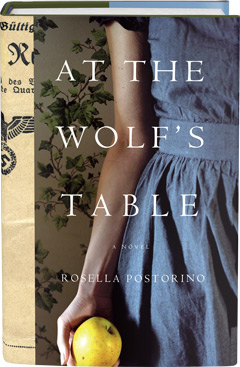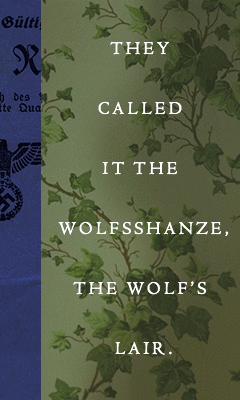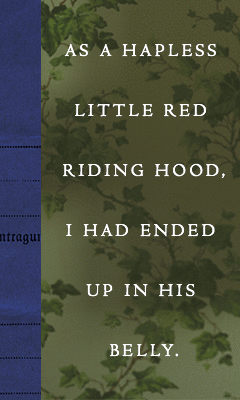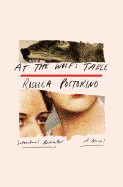At the Wolf's Table
by Rosella Postorino
Adolf Hitler famously feared death by poisoning. Increasingly paranoid that his enemies would find a way to sneak contaminated food into the Wolfsschanze, his heavily guarded headquarters in East Prussia, he conscripted a handful of young women to serve as food tasters. Ten women from the nearby village of Gross-Partsch were driven to the Wolfsschanze each day, made to eat the vegetarian meals prepared for Hitler, then wait an hour to ensure that the Führer's food was safe to consume. Inspired by the real-life account of one taster, who told her story many years later, Italian novelist Rosella Postorino imagines the tasters' experience in her compelling fourth novel, At the Wolf's Table.
Rosa Sauer, Postorino's narrator, doesn't quite fit in with the other tasters. Reflective and somewhat detached, she recounts her childhood in Berlin, her courtship and eventual marriage to her boss, Gregor (now fighting at the front among thousands of other German men), and her mother's death in a bombing raid. Exiled to her in-laws' house in Gross-Partsch, Rosa sees herself and her new life with the keen eye of an outsider. She grows attached to Gregor's parents, Joseph and Herta, and comes to enjoy the country quiet. But their relative peace is upended when two things happen in quick succession: Rosa is conscripted as a food taster, and Gregor is reported as missing in action.
Not entirely convinced her husband is alive, but unwilling to believe he might be dead, either, Rosa spends the rest of the book (and the war) in an existential and emotional limbo. She climbs onto the bus every morning to perform her duties at the Wolfsschanze, returning home to help Herta with the household chores, wondering with every load of laundry and every mouthful of food whether any of it matters. She gradually becomes acquainted with her fellow tasters, but their situation is more suited to uneasy alliances than real friendship. In an atmosphere of tension and distrust, they must work together while keeping their guard up. Rosa's compatriots include Leni, childlike and innocent; Beate and Heike, both young mothers and lifelong friends whose bond leaves little room for anyone else; a group of women Rosa comes to call the Fanatics, whose devotion to their Führer leads to a fierce pride in their jobs; and Elfriede, enigmatic and sharp-tongued, to whom Rosa finds herself drawn.
The days mostly pass in uneventful fashion, but once in a while something happens to play on the women's myriad fears. The progress of the war seems mostly distant: despite their nearness to headquarters, the women receive little information. Their immediate concern, besides being poisoned, is their treatment at the hands of the local SS officers, which ranges from indifference to cold-eyed cruelty. Rosa, meanwhile, is wrestling with complicated emotions about her exile to this isolated area of the Reich, her feelings about her missing husband and her longing for a child. Adding to the complexity of her position are her tentative friendship with the local baroness and her growing relationship with Albert Ziegler, one of the Nazi officers in charge of the women.
Postorino's narrative is unusual among World War II novels. Rather than a story of stubborn resistance or unquestioning devotion to the Nazi cause, Rosa and her colleagues live in the gray area between. Rosa knows, as do they all, that their actions are tantamount to collaboration, but they also realize the privilege afforded them by a steady paycheck and three filling meals a day. Rosa, in particular, seems to find herself swept along by circumstance, though she gradually realizes that she must reckon with the implications not only of her actions, but of her willingness to go along with a cruel and corrupt system. As the war and the situation at the Wolfsschanze both drag on, Rosa remains an unwilling participant in both--but neither state of affairs will last forever.
Postorino ratchets up the tension in each chapter, mostly through small, troubling incidents: heightened security, whispers of battles lost at the front. Several larger events send shock waves through Rosa's tenuous community, and she wonders how long any of them will manage to survive. Not quite sure whether to call herself a victim or a collaborator, Rosa spends the waning years of the war navigating the space where those roles overlap.
Postorino's novel explores difficult questions: When does survival become an act of guilt? Do we bear responsibility toward those we know, or only those we love? Is it ever acceptable to support an evil regime? And is having no choice--or few choices--a justification for any action? Looking back on her experiences, Rosa finds no simple answers. But Postorino's narrative does justice to the complex nature of wartime, complicity and the consequences of breaking bread with (and for) the enemy. --Katie Noah Gibson








